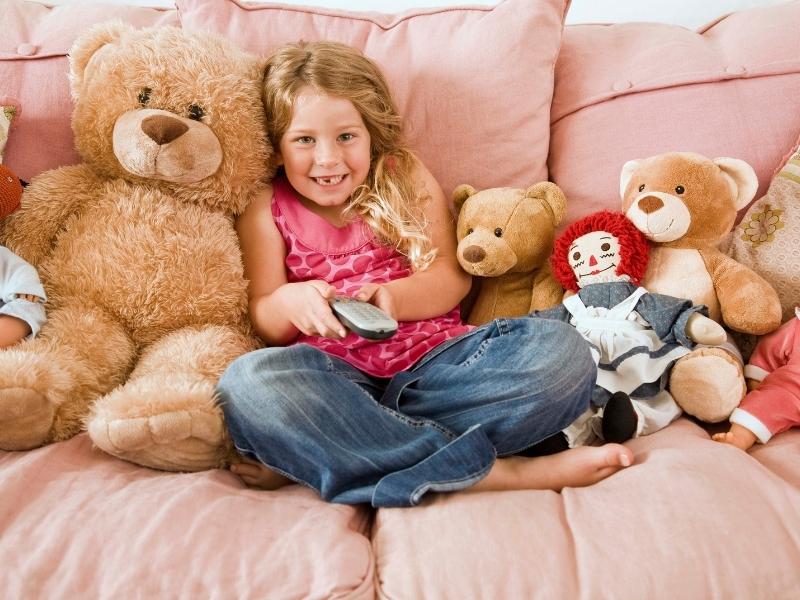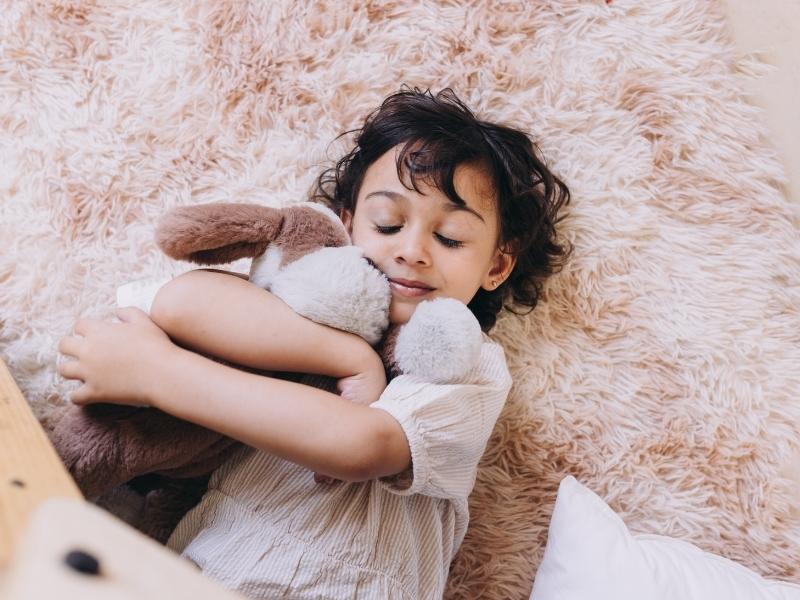What Age Should a Child Stop Playing with Stuffed Animals?

This post may contain affiliate links. If you buy through the link, I may earn a commission. Learn More.
Stuffed animals, sometimes called plushies, are beloved toys children use for pretend play and comfort.
Parents might feel their child is acting immature if they play with a stuffed toy past a certain age. How old is too old for stuffed animals?
The answer might surprise you.
*FYI, some of the links in this article about at what age should a child stop playing with stuffed animals may be affiliate links. If you click and make a purchase, we may get a commission (at no extra cost to you). For more info, please see our disclaimer.
At What Age Should a Child Stop Playing with Stuffed Animals?
It is unnecessary to put an age limit on loving a stuffed animal. A child may carry a plush toy with them for comfort through about age five. Most will continue playing with them through age 10. Many sleep with their stuffed animals far later and even into adulthood.
A Child’s First Stuffed Animal
A baby may receive a stuffed animal as a gift before they are even born.
Many parents use plush rattles to entertain young children. They will then hug, kiss, and chew on the stuffed item when they are at play.
The texture of a plush toy is pleasing to a baby. It gives them comfort when they need it the most.
PRO TIP
Babies should not sleep with plush toys. Even the smallest ones can serve as a choking hazard.
Do not allow a baby to sleep or nap with a plushie until they are at least one year old.
The Psychology of Plush Toys

When I was in the second grade, I received a plush elephant from a friend at school.
It was special to me because it was the first stuffed toy I owned that wasn’t a hand-me-down from an older sibling.
My parents argued that, at eight years old, I was too old for stuffed animals. However, I slept with my toy until the stuffing came out of it, and it had to go to that plush elephant graveyard in the sky. I was about 16.
Experts agree that there is nothing wrong with sleeping with a stuffed animal even into adulthood.
A stuffed toy acts as a replacement for a friend when you feel lonely. It makes you feel both safe and secure. This is something we all need, from age one to 101.
Related: Why Do Kids Eat Glue?
When to Stop Relying on Stuffed Animals
Active play with stuffed animals gives children their first glimpse into social interaction.
They can role play with their animals to learn how to build relationships with others. This is vital for toddlers and preschoolers who have limited experience with others.
As children age, they may find themselves needed to act out certain scenarios with their plush toys. They can manage conflicts or seek refuge in stuffed animals.
Most children will stop doing this when they are old enough to have good communication skills. However, some kids may need to continue using stuffed animals to help them through some of life’s many struggles.
If so, that is perfectly fine, acceptable and healthy.
Key Takeaways
Don’t push your child to grow up too fast.
Letting them find comfort in a stuffed animal doesn’t damage them psychologically and can, in fact, give them a healthier and more secure childhood.
Do you have thoughts on stuffed animals? Share them in the comments!
Related Articles

I’ve always believed that there’s no ‘right’ age to stop playing with stuffed animals. My child’s teddy bear is a constant source of comfort and companionship, even as they grow older. I also wrote about it in an article about: “At what age should a child stop having a teddy bear?” – [link deleted by admin]